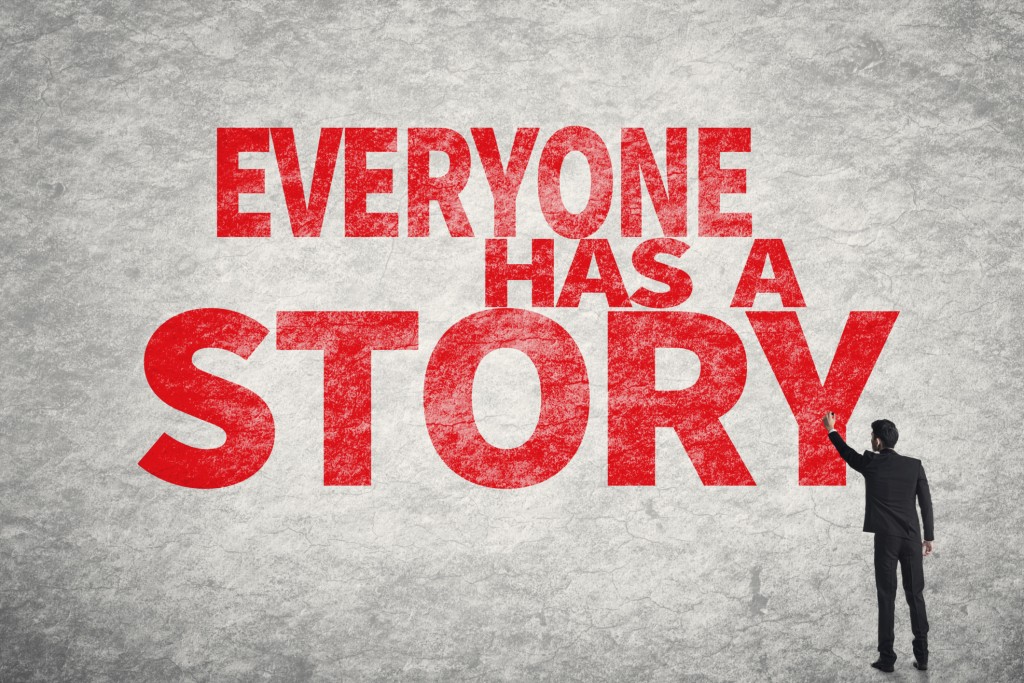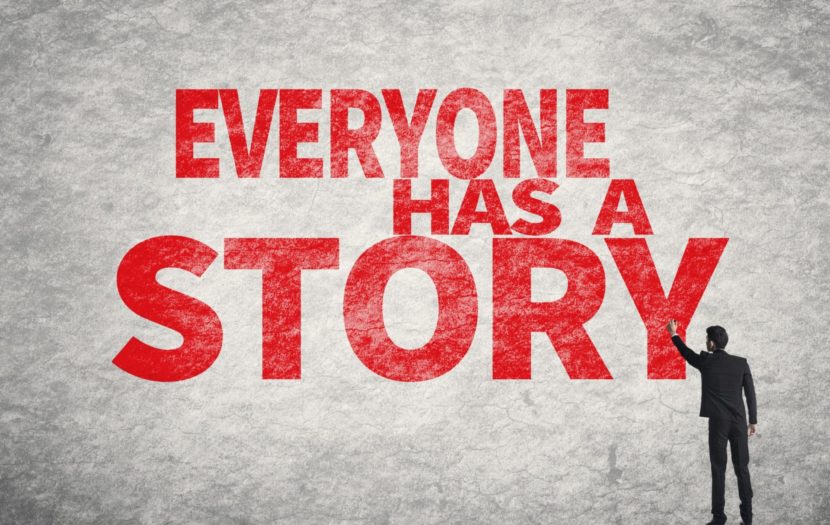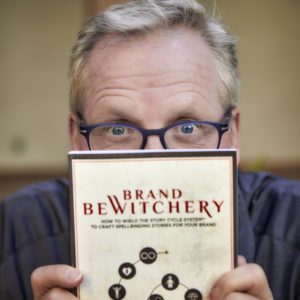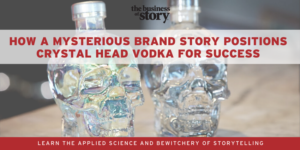
Every week, I will share the five stories that I have found useful to help our clients and my students sharpen their business storytelling skills. Some are new articles, while others are gems from the Business of Story archives.
Let’s begin with a video from The Future of Storytelling conference, which was in New York last week. Unfortunately, I couldn’t make. Fortunately, it was because I was speaking at Michael Gass’ inaugural Fuel Lines Ad Agency New Business conference in Nashville. The two-day program was excellent, and I highly recommend it if you are puzzled as to how to grow your agency in this weird world we live in.
1. Seeing is believing, but it’s probably not the truth
Ever wonder what your audience is thinking? Forget about it. Beau Lotto is a neuroscientist who studies human perception. In this four-minute video, Understanding Perception: How We Experience the Meaning We Create, he helps us realize that “we don’t see the real world—just our version of it.”
This is important for all business communicators, because we often think we know our audiences and what’s on their minds. In reality, our perception of what they care about is as distorted as their view is of us. This video is a great reminder for all business leaders, brand strategists and content marketers to take the time to understand and empathize with your audiences to craft compelling narratives from their point-of-view. As Lotto explains, “Our perception is just a story we tell ourselves.”
Beau Lotto – Understanding Perception: How We Experience the Meaning We Create from Future Of StoryTelling on Vimeo.
2. 20 of the most memorable brand slogans [Infographic]
From HubSpot’s Agency Post, I pulled the infographic created by SiteProNews on what makes a memorable advertising slogan. I don’t know, some of the ones they pick are as lame as they are memorable, at least to me. Like McDonald’s “I’m loving it.” What do you think? What makes a great slogan? Personally, I like something that triggers a story in your mind. Like Alka-Seltzer’s old, “Plop, plop, fizz, fizz, oh what a relief it is.” It has a snappy jingle attached to it as well, which aids in memorability.
My favorite of this bunch: Red Bull Gives You Wings. It’s a promise that evokes a story in your mind of what giving you wings means from your perspective (See #1 in this post). And it delivers with tons of sugar and caffeine.

3. The easiest way to find your story
I’ve been a huge fan of the “And, But & Therefore” approach to creating the foundation for a story for a long time. The New York Times thinks it’s pretty cool as well. In this post by Andrew C. Revkin, From South Park to the Space Station, Randy Olson Sees an ‘And, But, Therefore’ Story Solution, he covers how Olson helps scientists connect with society through stories. His work is based on a simple formula that has made Eric Cartman of South Park a cult superhero. You should also know that Olson was a recent guest on my Business of Story podcast. Here’s his story.
4. Why storytelling is the ultimate weapon
This article from Fast Company’s Co-Create archive is a staple in my storytelling curriculum. Jonathan Gottschall, Author of The Story Telling Animal: How Stories Make Us Human, describes how business communicators can use storytelling as a Trojan Horse to deliver data, facts and stats in a meaningful way to audiences. Lotto’s video at the top of this post reminds us that we are all meaning-making machines, and one of the only ways to impact perception, especially around data, is by encapsulating it in a well-told story.
5. Warming up technology through story
This segment from Mad Men of Don Draper selling Kodak on the Carousel Projector concept is terrific storytelling. Watch and learn.
Every Friday, I will share an update on what I find in the world of business storytelling. Please feel free to send me your articles, blog posts, videos and infographics for potential inclusion in my post.
Story on!












at 2:58 pm
[…] 5 storytelling resources to help hone your business and brand communication Every week, I will share the five stories that I have found useful to help our clients and my students sharpen their business storytelling skills. Some are new articles, while others are gems from the Business of Story archives. Let’s begin with a video from The Future of Storytelling conference, which was in New York last week. Unfortunately, I couldn’t make. Fortunately, it was because I was speaking at Michael Gass’ inaugural Fuel Lines Ad Agency New Business conference in Nashville. The two-day program was excellent, and I highly recommend it if you are puzzled as to how to grow your agency in this weird world we live in. 1. Seeing is believing, but it’s probably not the truth Ever wonder what your audience is thinking? Forget about it. Beau Lotto is a neuroscientist who studies human perception. In this four-minute video, Understanding Perception: How We Experience the Meaning We Create, […] The evolution of you and your brand is in how well you tell your stories (This post originally appeared in LinkedIN Pulse.) Our brain, like the amoeba, has one main goal: Survival. We can go weeks without food, days without water, but only about 35 seconds without finding meaning in something. We constantly scan our environment, probing for clues beneath the surface, with an embedded app. called curiosity. Curiosity is our primal search engine that captures insight, filters it through past experience, to help our mind predict the future in an endless battle to find clarity in the chaos around us. Nature helps in our hunt for meaning by enticing us with story to draw our rapt attention. We live vicariously through story, trying on trouble, to learn what to do in case it happens to us. Powerful stories use urgency, novelty and surprise to deliver a truth. The truth is, we all have one true superpower. Storytelling. Is there any more persuasive action you can take […] Cartman’s storytelling secret that every CMO should steal I teach business storytelling workshops around the country and in the new Executive Master’s for Sustainability Leadership program at Arizona State University, and the impact these newly story-empowered executives have when they use narrative to communicate data is profound. But my students’ greatest obstacle is finding where to start in the story process. Therefore, I have them begin with the And, But and Therefore (ABT) method: a simple formula that I call the DNA of all stories. Harvard Ph.D.-turned-USC film school graduate, Randy Olson, uncovered the ABT from the most unlikely of places: South Park. He was watching a documentary, “6 Days to Air,” about the manic schedule Trey Parker follows to create each episode of the crass but brilliant cartoon, when the secret was unveiled. When a script isn’t working for Parker, he goes back and replaces “ands” with “buts,” which creates conflict and tension in the story: the secret […] Why top business communicators think in scenes Data is the foundation for most business stories, but data is NOT the story. If we rely solely on the data as our storyline, as so many business communicators do, we lose our audiences. End of story. Because data does just one of three things: It reports on an event that has happened, monitors an event that is currently happening, or attempts to predict an event that will happen. Although data can be alarming, our brains are mostly interested in the event. Why? Because events can kill us. Data can’t. Therefore, data, stats and facts are fairly inert to our brains, unless they are wrapped in story. On this week’s episode of Business of Story podcast, the founder of Creative Nonfiction and author of numerous books, including You Can’t Make This Stuff Up: The Complete Guide to Writing Creative Nonfiction from Memoir to Literary Journalism and Everything in Between, Lee Gutkind, provides tips on how […] 10 screenwriting tips every brand storyteller should know Learn from legendary screenwriting coach, Robert McKee, how to become a better business communicator on the current episode of Business of Story podcast. Three years ago I spent four days in a dark and freezing Sheraton LAX ballroom with Robert McKee. “If your cell phone goes off during my seminar, you will come up here to my stage and give me $10 in front of all of your screenwriting pals. If it goes off a second time, you’re kicked out. Because one ring is an accident. The second one tells me you’re an asshole.” I was one of nearly 250 people in attendance, most of them aspiring screenwriters. But I was there to learn from Hollywood how to become a more persuasive leader, brand strategist and content marketer through the stories I tell. “If your cell phone goes off during my seminar, you will come up here to my stage and give […] […]